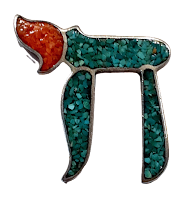The Forward Comes Through: This week has been all about Whoopi Goldberg. No, it really hasn't - but Abq Jew couldn't seem to get what's left of his mind wrapping around anything else.
Until he caught this article in the Forward.
Inspired in part by all the Jewish artists on Rolling Stone’s list of the 500 Greatest Songs, the Forward decided it was time to rank the best Jewish pop songs of all time. You can find the whole list and accompanying essays here.
Having, of course, nothing better to do, contemplating Whoopi Goldberg while watching the snow fall, Abq Jew took a look.
The 150, of course, includes all the usual suspects - Bob Dylan (Highway 61 Revisited, et al); Leonard Cohen (You Want It Darker, et al); Paul Simon (The Boxer, et al); Lou Reed ( My House, et al); Kinky Friedman (They Ain’t Makin’ Jews Like Jesus Anymore, et al); Janis Ian (Tattoo, et al).
And plenty of - to Abq Jew, at any rate - lesser-known artists and songs -The Crows (Mambo Shevitz); Hip Hop Hoodios (Knishin’ in the Mission).
But what caught Abq Jew's eyes and ears, now that we're all talking about Maus ... and Whoopi Goldberg, was this.
The recording is by Jay Black (born David Blatt). Abq Jew wrote about him (see Jay Black, The Voice, Dies at 82) when he left this world in October.
PJ Grisar of the Forward writes:
Jay Black, who died this year, may not have made it through yeshiva, but he was keenly aware of his Jewishness, going so far as to devote a 1966 B-side to this song, sung in Yiddish and then in English as a tribute to family lost to the Shoah.
His plaintive voice is unmistakable, his nigunim impeccable and — no surprise given it was his first language — his Yiddish is perfect.
That Black’s label agreed to print a song in Yiddish for an English-speaking crowd tells you all you need to know about the power of his performance.
Albert (Abraham) Diner wrote on YouTube:
In 1966 Jay Black took a standard Yiddish song and adapted it into a version to demonstrate his feelings about the Holocaust.
After a long struggle with the record company, he convinced them to let him record it. While recording it he worked with Artie Butler to help him with the arrangement, since Jay comes from an Orthodox Jewish background.
Jay Black - who was born David Blatt - is the voice, the creator and everything you hear on that vocal. A superb interpretation seldom heard in recordings of this song.
I feel he showed us a facet of his personality that's quite mature for someone in his twenties:
A young man singing about the horrors of the Holocaust, recorded in a vinyl LP intended for the teenagers who buy pop/rock, and sung in Yiddish first, and then the second half of the song in English.
Only one other major Jewish vocalist, Steve Lawrence, included a Yiddish song in his popular repertory, a song titled Where Can I Go?, also about the Holocaust period.
Steve Lawrence sang the English lyrics first, followed by the Yiddish lyrics. Jay Black took a higher risk singing the Yiddish lyrics first.
And then there's the Whoopi Goldberg story. No, Abq Jew does not know Whoopi Goldberg personally - and, chances are, neither do you. But she has always seemed like a nice, intelligent person who happens to support causes that seem generally liberal. An OKnik.
Everyone knows (by now) that she was born Caryn Elaine Johnson in 1955. No, she is not Jewish - although she has claimed to feel Jewish. As far as can be determined, she has no Jewish ancestors, certainly none with the family name Goldberg. She took the name Whoopi Goldberg so she could, like a farmer, stand out in her field.
Whoopi Goldberg, like many Americans who grew up after the Holocaust in the Civil Rights era, tended (until this week, one presumes) to think of race as a matter of skin color. In the 1930s, Americans - and Europeans - did not.
Whoopi Goldberg shouted out her benevolent ignorance and has now shouted out her heartfelt apology and new learning. It's enough. Let it go. We have many more important things to worry about.
This is an example of the nudity that prompted a Tennessee
school board to remove Art Spiegelman's Pulitzer Prize-winning
graphic novel Maus: A Survivor's Tale from its schools.
Yes, we are talking about naked mice.
A Forward Webinar
Join the Forward at 5:30 pm (New Mexico Time) on Wednesday, February 16, for a spirited discussion of the Greatest Jewish Pop Songs of All Time featuring Forward contributing editor and author Seth Rogovoy; executive editor Adam Langer; former Vibe and Spin editor-in-chief of Vibe, Alan Light; DJ and SirusXM host Hesta Prynn; novelist and screenwriter Jennifer Gilmore; and Forward contributing music critic Dan Epstein. Register here.
 |
| Navajo Moose Chai Pendant |




No comments:
Post a Comment